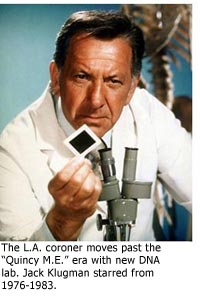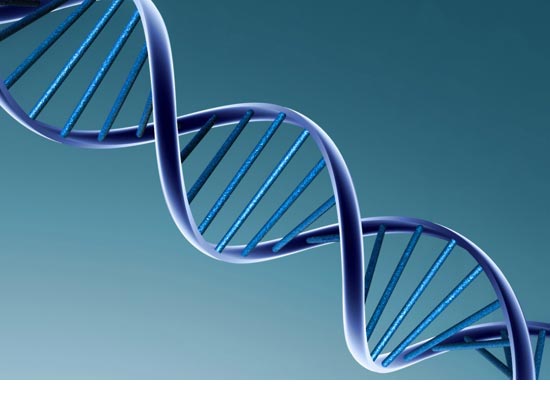L.A. Coroner gets some hi-tech help
July 14, 2010
It’s a “CSI” world out there. But when it comes to in-house DNA testing, the L.A. County coroner’s office might as well be back in the “Quincy” era.
That’s about to change. Armed with start-up funding from the county’s Quality and Productivity Commission, the department is embarking on a plan to create its own small DNA lab. The department will hire expert consultants who will help it establish an accredited lab that can help coroner’s officials solve some of their toughest cases—and perhaps even turn a profit.
The proposal for the lab, which will be funded for three years with $1.6 million annually from the commission’s Productivity Investment Fund, was approved by Los Angeles County Supervisors on Tuesday.
Anthony T. Hernandez, director of the coroner’s department, said establishment of the lab is “way overdue.” New York City’s Office of Chief Medical Examiner has the largest coroner’s DNA lab in the country, and has been performing such testing since 1991.
In L.A. County, a primary function of the new lab will be to shortcut the often time-consuming—and sometimes futile—work of identifying the 350 to 400 John and Jane Does who come through the coroner’s office annually. There are at least 25 such “hardcore” cases that elude investigators each year, Hernandez said.
Having a DNA lab also will allow coroner’s officials to take on the 100 or so paternity requests it receives each year. These often come from people trying to claim Social Security or other benefits for children of people who have died. As it stands now, their requests must be farmed out to private DNA analysis firms.
Others turn to the coroner’s office seeking paternity information that will help them come to terms with mysteries that have haunted them all their lives.
“It does fill an emotional void for a lot of folks,” Hernandez said.
Once the lab is up and running, the coroner’s office says it also will be able to assist law enforcement agencies struggling with a backlog of cases, including large numbers of untested sexual assault kits that have plagued agencies such as the Los Angeles Sheriff’s Department.
“We don’t profess to make a giant dent in that, but we think we could help,” Hernandez said.
 Dr. Lakshmanan Sathyavagiswaran, the county’s Chief Medical Examiner/Coroner, said he’s excited about the possibilities of the new lab from an investigative standpoint.
Dr. Lakshmanan Sathyavagiswaran, the county’s Chief Medical Examiner/Coroner, said he’s excited about the possibilities of the new lab from an investigative standpoint.
“I’m all for it,” Sathyavagiswaran said. “We’ll be a full-service department.”
Sathyavagiswaran, in an interview outside the Board of Supervisors hearing room, said the new lab will be helpful in “subtle cases where it’ll enhance the quality of death investigation.” Those cases include deaths by Long QT Syndrome, in which the heart stops for no obvious reason, such as in an apparently healthy high school athlete. DNA testing also could be useful in uncovering hidden crimes in cases where the cause of death was obvious–for example, a woman who’d died of a heroin overdose but also may have been the victim of a rape before her body was dumped.
“The citizens of L.A. will benefit from this DNA laboratory,” Sathyavagiswaran said in a follow-up email.
With 18,000 deaths reported to the L.A. County coroner’s office each year, it ranks as one of the world’s busiest, with responsibility for investigating thousands of violent or unusual deaths each year, along with notifying next of kin and determining how and why deaths occurred.
Dr. Jeffrey Jentzen, a chair of the National Association of Medical Examiners’ committee on inspections and accreditation, said it makes sense for L.A. to join other major jurisdictions like New York and Houston in having an in-house coroner’s DNA lab.
“The quicker you can make identifications, the better you can keep the flow of bodies moving and avoid backups,” Jentzen said.
There are also financial incentives, according to Hernandez. He said the lab is expected to generate revenue from paternity testing and from collecting fees from law enforcement agencies and smaller coroner’s offices seeking help with their cases.
“We have been working on the implementation of DNA testing since late 2006,” Hernandez said. One reason it took so long is that the department tried to find a way to establish the new lab “in a way that doesn’t cost the county anything.”
The seed money from the productivity commission fund, he said, will enable the department lab to start small and grow into a self-supporting and eventually profitable endeavor.
It also could help the department keep up with the expectations of the television-watching public. Said Hernandez: “You’d be surprised how many folks do think ‘It’s the coroner. It’s just like CSI.’ “
Posted 7/14/10













 405 bridge work causes a stink
405 bridge work causes a stink
